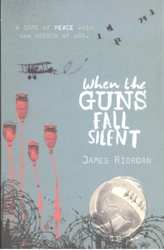 Published in the centenary year of the Great War, this novel handles the commemoration of a historical event like this in a sensitive and respectable way. It is thought provoking and shocking to see the events of 1914 through young eyes. The tone is not celebratory or bombastic, but respectably applauds the hope and the spirit that can be shown by individuals even under the most atrocious circumstances. There's a sort of gently shocked disbelief that something as tragic and as mindless as this could ever have happened.
Published in the centenary year of the Great War, this novel handles the commemoration of a historical event like this in a sensitive and respectable way. It is thought provoking and shocking to see the events of 1914 through young eyes. The tone is not celebratory or bombastic, but respectably applauds the hope and the spirit that can be shown by individuals even under the most atrocious circumstances. There's a sort of gently shocked disbelief that something as tragic and as mindless as this could ever have happened.Set in 1954, 50 years after the end of the Great War, When the Guns Fall Silent sees Perry and his grandfather visiting the War graves in Flanders. After finding an old photo resting on grave of a long dead friend, Perry is taken aback when his Grandfather speaks for the first time of his experiences in the war and he begins to tell his story of the conflict and the famous Christmas ceasefire that resulted in one of the most famous football matches of the 20th century.
Jack tells the story of his and his best friend Harry's pre-War football prospects, their underage sign up, the horror of the trenches and the miserable months spent in waist deep mud, all the senseless killing. But he also remembers the incredible, impossible moment that the guns fall silent and the Germans and the British forces joined together to celebrate Christmas, to swap stories, songs and trinkets and to turn the body-strewn, frozen cesspit of No Man's Land into a football pitch for one day. Jack recalls to Perry how it was on that day that he realised that the regular German people, shipped unwillingly to France and Belgium to rot and to die had no more quarrel with the British soldiers than he had with any of them. They were all fighting somebody else's war.
The bookending of war narrative with present day (well, 1954) action contextualises the events, makes the lasting effects of war evident. The style of the novel is simple, emotional and evocative- 17 year old Jack does a good job of documenting the experience of a "soldier" with zero previous experience. He's confused and fails to understand the reason behind the blind, meaningless hatred they are required to show towards people they don't even really care about. Jack has more humanity than that and sees the German forces for what they are- scared boys a long way from home, just like him. His narrative is clear, full of pain and suffering and horror. He watches his childhood friends die one by one, recounts his sometimes hopeful, sometimes bitter letters home to his sister and describes in thorough detail the day to day conditions in the freezing trenches.
I also really liked the decision to include some original War poetry at the beginning of some of the chapters- snippets from famous poets such as Rupert Brooke, Rudyard Kipling and Ezra Pound that set the tone for what's to come as the narrative unfolds- they tell such similar stories of death and despair. The book strikes a good balance between the speculative, fictional elements and the first hand experience of the poets. The author also includes poetry from those left behind and translations of Russian and German poetry, reminding the modern reader that poetry of the first World War was not something unique to the British and providing stories and experiences from different perspectives.
The dual appearance of football in this novel, I think, is going to make it a bit of a hit with non-reader boys. I get a lot of requests for football stories, and I think this is a really satisfying, thought provoking one. The book presents football, in times of peace, as the pinnacle of normal- it's the weekly event that brings towns together to hope and celebrate and applaud. The parallels between football and War are drawn, but it's not something that's pursued to any great extent. It's also evident that even in times of war, football is a common ground, a great equaliser, still capable of inspiring hope and celebration.

No comments:
Post a Comment